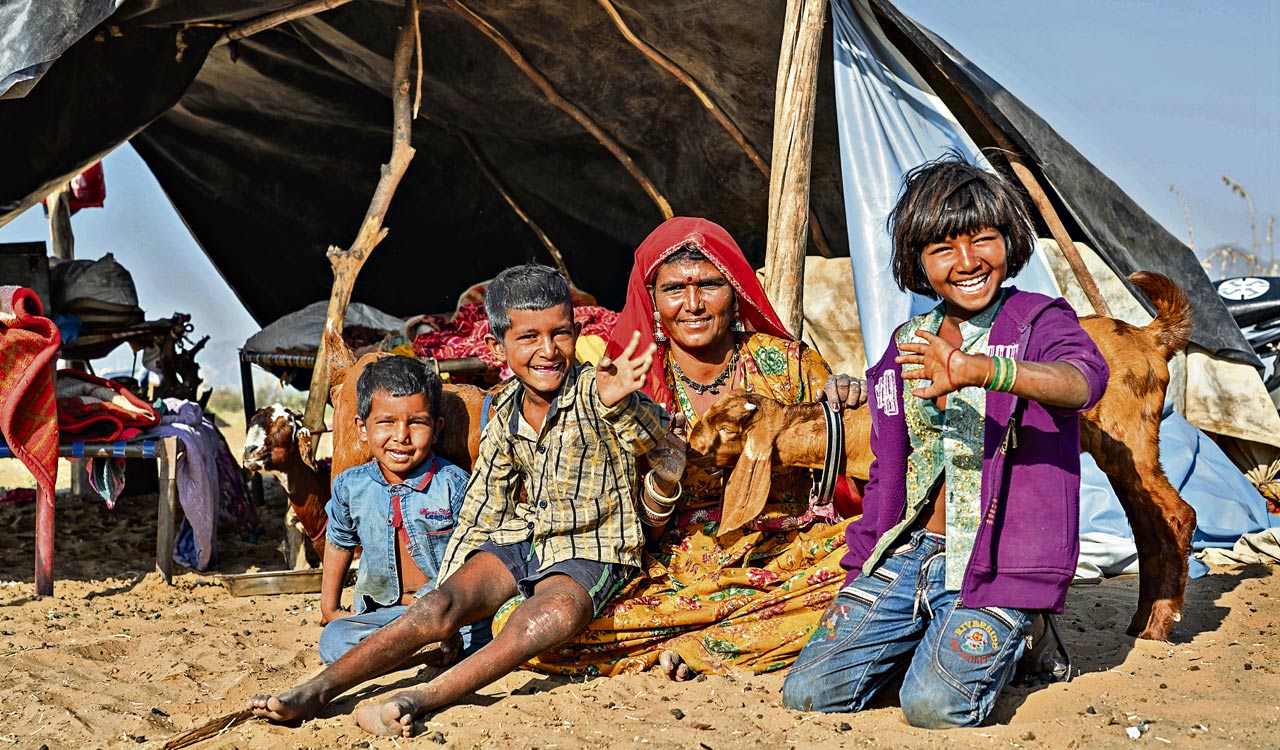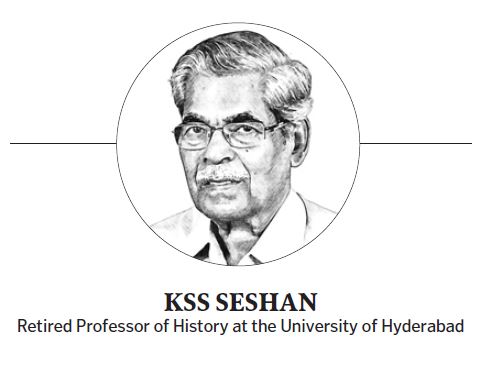Govt must keep their identity intact without reducing them to dumb uniformity in the name of ‘development’
Published Date – 9 January 2024, 11:45 PM

By KSS Seshan
A senior news reporter of a prominent vernacular daily, at the height of Covid-19, had gone during the protracted lockdown to report on the condition of people in the remote villages of the southern most parts of Chittoor district, bordering Karnataka. He strayed into a discreet settlement of nomads locally called ‘Shikari Colony’ on the fringes of nearby forests, far from the regular villages. Shikaris are generally called ‘bird catchers’, and are easily identified with the empty Dalda tin and a radio transistor that the male members invariably carry. The women folk wear colourful skirts and cover their heads with dupatta. These tribals speak a dialect that seems to be very distinct. The Shikaris are in good numbers even in other districts of the Telugu States.
These nomads subsist on selling beads in neighbouring villages. But to the reporter’s surprise, the nomads, numbering about 100 belonging to nearly 30 families and living in a cluster of a few huts, were burning some wild roots, not known to be edible, to keep the body and soul together, as they were barred from entering any village to sell their wares to make a living due to the fear of the coronavirus. This heart-wrenching story that appeared in the local press stirred the conscience of the local people. A few volunteers and voluntary organisations came forward, collected rice and other essentials and rushed them to the starved inhabitants of the Shikari Colony.
Nowhere People
During the lockdown, while some efforts were made about the welfare of the migrant labourers who were stranded in different States without food and shelter, no such effort was made either by the government or the public on the plight of the nomadic tribes. The nomads are the most vulnerable as they generally live away from the main social order. There has been no initiative to bring them into the mainstream. Their children are seldom admitted to schools. They do not have Aadhaar or residential proof for voter identity cards or ration cards as habitually they are always on the move.
There is every need for the government and civil society to look for such marginalised nomadic tribes whose support system has collapsed ever since the protracted lockdown. In Telangana, for example, in Mahbubnagar, Ranga Reddy, Warangal and Nalgonda districts alone, it is believed that about 15 nomadic tribes like Siddula, Dommara, Vaddera, Dasari, Budagajangam, Kanche Erukala, Katikala, Pamula Parade and Shikari exist. It is also interesting that even among the Muslims, communities like Faqir, Ghante Fakir and Goshayaries come under the nomadic category. Like their counterparts in other States, the nomadic tribes in Telangana are also regarded as ‘nowhere people’. It is ironic that when every section of society is enjoying freebies of every type doled out by the government, the nomads are kept away from such benefits.
Archaic Acts
At the national level, it is estimated that there are about 15 crore nomadic people in the country, better known these days by the nomenclature De-Notified Tribes (DNT). In fact, before the Centre took the task of ‘de-notifying’, they were ‘notified’ as per the obnoxious Criminal Tribes Act of 1871 by the colonial British government. Nearly 200 different tribal communities all over British India were notified as ‘hereditary criminals’, ‘habitual criminals’ ‘known depredators’ (KD) etc. The derogatory term KD remains in the local vocabulary even now. There were also a few settlements, locally known as ‘Criminal Settlements’, exclusively set up for reforming such nomadic tribes both by the government and social reformers of the day. These ‘Criminal Settlements’ were mute reminders of the way the few nomadic tribes were subjected to segregation, stigmatisation and humiliation by the colonial government of the period. These settlements were looked down so much that for several decades even after the country got independence, any crime anywhere in the vicinity led the police first to the inhabitants of those settlements for investigation. The Stuartpuram Settlement in Andhra Pradesh was a case in point.
It was only after independence that the Centre repealed many of such heinous Acts and removed the inhuman practice of holding the collective burden of criminality to the individual by bringing in the Habitual Offenders Act. However, the nomadic and semi-nomadic communities continue to face harassment at the hands of governmental agencies and exclusive neglect from civil society even now. The Centre in 2015 constituted the National Commission for Denotified, Nomadic Tribes and Semi-Nomadic Tribes to suggest suitable measures for recommending welfare policies pertaining to the itinerant and nomadic tribes. But the commission and its recommendations remain mostly on paper.
‘Exclusive’ Existence
The nomadic tribes abound in all the States, more so in South India. In Tamil Nadu, Narikuravas are a variant of Guvvalondlu (Shikaris) in the Telugu States. These tribals live in small clusters of huts put up with cloth or tarpaulin as roofs on the fringes of the villages and make a living by hunting birds, rabbits and even squirrels. The women folk sell pins, needles and beads to supplement the family’s income. Other nomadic tribes like Chatiyadikars, Pambatti, Madaari and Kalaikoothadi have different avocations. They live in the mangrove forests and marshy lands to hunt wild crabs and fish. In Karnataka, the itinerant tribes like Budabukkala, Jogi, Helava and Killekayata have their distinct but highly isolated existence with not even an iota of governmental intrusion into their lives. The Sudugadu Siddas, another such tribe in the Hassan area, still have no sops from the State government. The Yanadis, Chenchus, Dommaras and a host of other nomads in Andhra Pradesh too have their exclusive existence.
The distinct lifestyle of these nomadic tribes should not be an excuse to exclude them from their access to socioeconomic welfare benefits on a par with the people having a settled life. Positive affirmation and development policies that cater to the longstanding needs of these nomadic tribals by the government are the need of the hour. During days when the entire support system in the country is affected, like the prolonged lockdown, the government and other agencies should be proactive to reach out to these unfortunate nomads since they themselves would understandably refrain from seeking outside help, governmental or non-governmental.
As the pandemic proved to be more harsh towards such nomads, it is highly pertinent to think of the well-being of even these fringe groups, as the adage says, ‘a chain is as strong as the weakest link’. It is also imperative that while improving the levels of living, authorities should recognise the distinct identity of such tribes and help keep that identity intact without reducing them to dumb uniformity in the name of “development” as the nomadic tribes have also been an integral part of the culture, heritage and history of our country.





